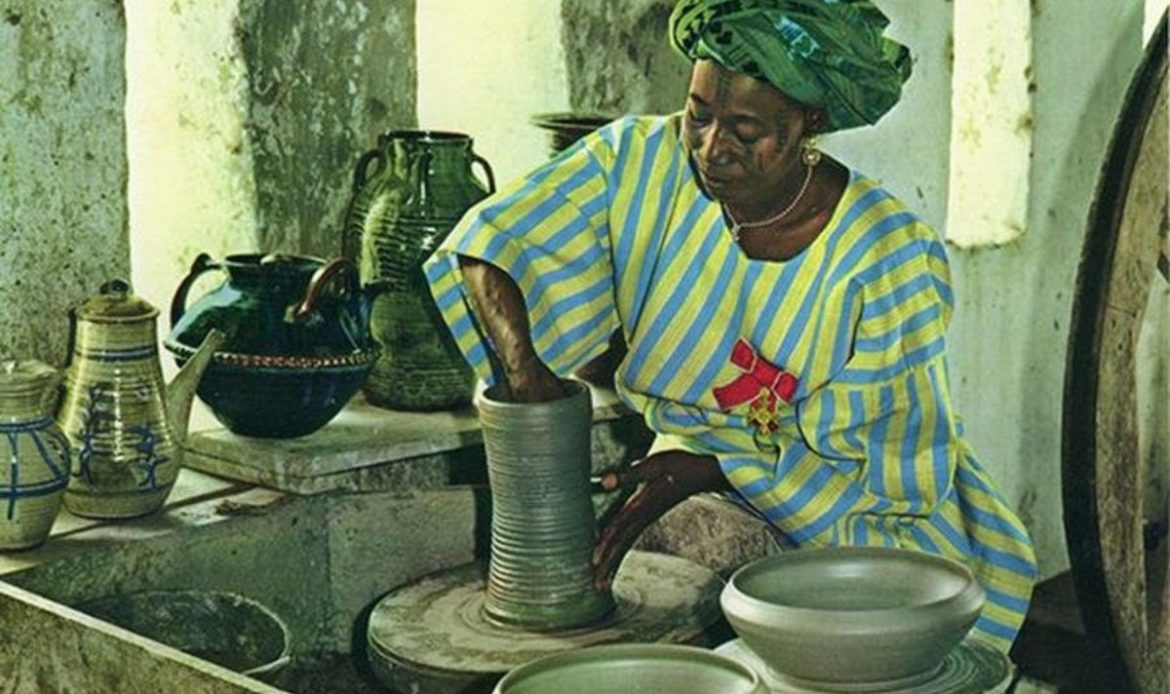Ladi Kwali, the Pioneer of Modern Pottery in Nigeria

Dr Hadiza Ladi Kwali is known as the pioneer of modern pottery in Nigeria. Born in 1925, in Kwali – the Gwari region of Northern Nigeria, where pottery was an indigenous occupation among women, Ladi Kwali learned to make pottery as a child by her aunt using the traditional method of coiling. Growing up in a family that kept up with the female tradition of pottery making, Ladi made large pots for use as water jars, cooking pots, and bowls. They were decorated and styled in figurative patterns such as scorpions, lizards, crocodiles, chameleons, snakes, birds, and fish.
Ladi Kwali would impress patterns on top of the figures by rolling small roulettes of twisted string or notched wood over the surface of the clay, sometimes as horizontal banding and sometimes in vertical panels. The wooden roulettes mostly consisted of small cylinders of hardwood, two or three inches long and a half-inch in diameter, notched with straight, oblique, or parallel patterns. Ladi Kwali’s pots were unique for their beautiful forms and decoration, and she was recognized regionally as a gifted and special potter. Lots of her works were acquired by the Emir of Abuja, Alhaji Suleiman Barau, as seen by Michael Cardew in 1950.
This stirred Cardew’s interest in her and in 1954, she joined his pottery training centre in Abuja and became the centre’s only female potter. There, she learnt the western methods of pottery including wheel throwing, glazing, kiln firing, production of saggars and the use of slip. As a result of her exceptional skills, she soon assumed the role of an instructor. When Cardew left his post in 1965, the Centre had attracted four additional women from Gwari: Halima Audu, Lami Toto, Assibi Iddo, and Kande Ushafa. These women worked together in one of the workshops, which they called ”Dakin Gwari” (the Gwari room), to hand-build large water pots.
Ladi Kwali excelled in the pottery crafts and her wares were often sold even before they were taken to the market. During her first professional years, the traditional cultural environment moved her to produced pottery pieces that were influenced by the Gbagyi tradition and identified with personal idioms.
From her cultural tradition, where females were primarily responsible for pottery, Ladi Kwali’s ceramics became “art objects”. Ladi Kwali’s pots were featured in international exhibitions of Abuja pottery in 1958, 1959, and 1962, organised by Cardew. In 1961, she gave demonstrations at the Royal College, Farnham, Wenford Bridge in Great Britain, France and Germany. In 1972, she toured America with Cardew.
Read Also: Queen Amina
Ladi Kwali’s work was shown to great acclaim in London at the Berkeley Galleries. She was awarded an MBE (Member of the Order of the British Empire) in 1963 and in
In 1977, she was awarded an honorary doctoral degree from Ahmadu Bello University in Zaria. In 1980, the Nigerian Government (from the Cabinet Office of the Federal Republic of Nigeria) invested in her the Nigerian National Order of Merit Award(NNOM), the highest national honour for academic achievement. The Potter also received the national honour of the Officer of the Order of the Niger (OON) in 1981.
To date, her picture remains at the back of the Nigerian N20 Naira note.
Tell us what you find interesting about Ladi Kwali.

2 comments
Good replies in return of this difficulty with real
arguments and describing the whole thing concerning that.
My web-site; rpu
What’s up, yeah this article is genuinely fastidious and I have learned lot of things
from it concerning blogging. thanks.
Comments are closed.